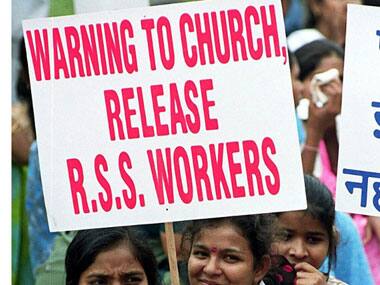Indian intellectuals, particularly the closet right wingers, are a notoriously timid species. They love to make a point through hints and insinuations rather than take the bull by the horn and assert their stand on issues. They hide behind expansive, pointless and repetitive arguments rather than come clear on what they want exactly. Their approach to secularism is a case in point. At present, the media space is flooded with acerbic criticism of the Congress version of secularism. By now, many intellectuals are busy convincing us that it is faux secularism, the sole purpose of which is minority appeasement. The Congress and other political parties in the same mould have no real sympathy for the minorities, particularly the Muslims. [caption id=“attachment_978061” align=“alignleft” width=“380”]  Representative image. AFP.[/caption] They have been using the latter as pawns in their self-serving political games and appeasing them since the community has the propensity to vote as a block, which is crucial to winning elections. So far, so good. Surely, we have heard all that before. Repetition of the same half-truth by more number of people does not leave us any wiser than before. Now, the hypocrisy part. It’s all right to criticise the faux secularism of the Congress kind, but why can’t these intellectuals openly claim that they support the Sangh Parivar’s version of secularism, whatever it is? Why cannot they muster courage to announce proudly that they believe in Hindu majoritarianism and its not-so-silent message that minorities of all hues must be shown their place in India? No other subject in the mainstream political discourse evokes more passion than secularism. The quantity of literature produced on it is mind-boggling. Yet, we are still in the blind over any alternate model of secularism. The vacuum is confounding indeed. The secularism debate, thus, has not moved beyond the starting block even after all these decades. We still don’t know the social cost of the brand new secularism project - if it really exists - and whether the country can afford it. Is the intrinsic illiberalism of political Hindutva compatible with the liberal philosophy of development-centric economic model? Where do minorities fit in this scheme of things? The answer is still awaited since the question has not been asked yet. The Sangh Parivar’s version of secularism could be an acceptable one, but we still don’t know what exactly it is. With due apology to the intellectuals, they have failed to enlighten on us on the challenges and opportunities in the new version of secularism. The Congress’ stand on secularism has been opportunistic all along. Whenever pushed against the wall, it resorts to raising the communal bogey. The problem for the party, however, is over decades the returns from the ploy has been diminishing. The Muslims no more vote for it en bloc. In the states, such as Uttar Pradesh, Bihar and West Bengal and others, regional parties are the new favourites of the community. Parties at the regional level are exploiting the fault lines in the community for electoral benefit and it’s now established that the en bloc voting by the community is an overblown myth. The community is apprehensive of the BJP for obvious reasons, but that does not leave Congress even as a minor beneficiary in most parts of the country. [embedalsosee] Our intellectual discourse on secularism hardly takes the changed circumstances into consideration. It also fails to take into consideration that secularism, of the Congress kind, has been usurped by so many other parties. Thus the forces of the Hindutva-secularism are up against a much bigger challenge than the Congress now. Without a highly sensitive communal issue, they won’t go far. Moreover, the truth about political Hindutva in India is it has been defeated by the people of the country repeatedly. Political parties are incidental. Our intellectuals would still love to push the case of a new brand of secularism loaded with exclusivist tendencies. The only problem is they have no clue what kind of a beast it is. They won’t answer this bigger poser either: if the Congress is accused of introducing aberrations into the Nehruvian-Gandhian model of secularism, should the response be to jettison it altogether or put corrective measures in place? One would appreciate if secularism debate became more sensible. And our intellectuals must show some courage and take a clear position on the issue. It would take the debate further and make it more productive and less vacuous.
It’s all right to criticise the secularism of the Congress kind, but why cannot our intellectuals claim openly that they support the Sangh Parivar’s version of secularism.
Advertisement
End of Article


)
)
)
)
)
)
)
)
)



